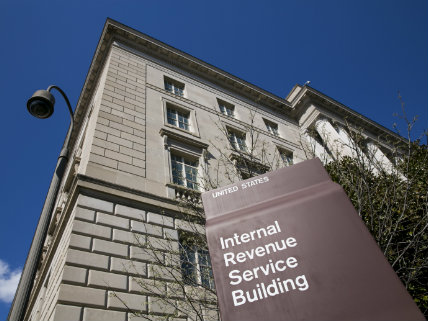IRS Agents Rented Million-Dollar Townhomes, Spent Hundreds of Nights in Luxury Hotels Last Year
Taxpayers paid for "excessive and inappropriate" lodging and travel costs, including for one employee who managed to travel 381 days of the year.

Taxpayers paid for IRS employees to rent million-dollar townhomes and luxury apartments, and covered hundreds of nights at the Ritz Carlton and other five star hotels during 2015.
A Senate Finance Committee report on long-term IRS travel released Thursday found that the 27 agents who traveled for more than half the year cost taxpayers, on average, $1.4 million per person. More than half of the travel expenses logged by those employees were for visits to Washington, D.C., and many times the IRS paid for luxury lodgings that the committee called "excessive and inappropriate."
That description is probably an understatement.
Terry Milholland, the former chief technology officer for the IRS, spent 168 days during fiscal year 2015 at the Grand Hyatt in Washington, D.C., costing taxpayers nearly $39,000. The hotel, located off H Street just blocks from the White House, boasts "spacious rooms that are cosmopolitan and sleek," featuring "infinite luxuries."
According to the Senate report, Milholland would routinely commute to Washington on Monday mornings and stay at the Grant Hyatt through Thursday, when he would turn to his home in Texas. Even though the Grand Hyatt is located within walking distance of the IRS Building and a Metro station, Milholland would take a taxi from the hotel to work every morning, running the meter for more than $1,500 during the year.
Another employee—who was not identified by name or position—shacked up at the Ritz Carlton in Pentagon City, Virginia, and left taxpayers with a $43,000 tab. The same employee spent another $29,000 in the same year at other D.C. area hotels, because you can't spend every night at the Ritz Carlton, or else it will start seem less magical.
Not to be outdone by their colleagues, two of the employees highlighted in the report skipped the luxury hotels and opted instead to stay in luxury apartments. One of them rented a $1.07 million four-bedroom townhouse in Arlington, Virginia, for a year at a rate of more than $4,900 per month. The other split his or her time between Washington, D.C., and Chicago, renting luxury apartments in both cities, with the leases apparently overlapping. The employee's Washington, D.C., apartment cost taxpayers more than $3,100 per month for nine month, while the Chicago apartment cost more than $4,600 per month during an 11-month lease.
One employee—Employee 16 in the committee's report—submitted an incredible 381 days' worth of travel reimbursements during 2015, a year that, like most, contained only 365 days. The employee "may have filed multiple vouchers covering the same period of time, which would result in the number of days in travel status exceeding 365," the report notes.
"The IRS has routinely failed to take allowable steps to reduce its travel expenditures," said U.S. Sen. Orrin Hatch, R-Utah, chairman of the Senate Finance Committee, in a statement. "The lack of effort by IRS employees to exercise prudence and economy when utilizing taxpayer funds is concerning, and more importantly, a direct apparent violation of [federal travel regulations]"
The IRS did not return requests for comment.
More than half of all travel by IRS employees brought them to Washington, D.C., with Atlanta (and Glynco, Georgia, an Atlanta suburb) accounting for the second (and third) most travel. Chicago and New York City were other popular destinations.
Federal employees traveling to Washington, D.C., for a month can spend as much as $7,000 on lodging alone, the committee found. At that point, one must wonder why the IRS is not buying those frequent visitors their own homes or apartments in the D.C. area, rather than filling up hotels.
There are "virtually no circumstances" where an employee would need to spend $7,000 per month on rent, the committee notes.
The Treasury's Office of the Inspector General found similar problems with IRS employees abusing travel expense in a 2013 audit, the Senate Finance Committee report notes, but no changes were made to improve the situation.


Show Comments (32)